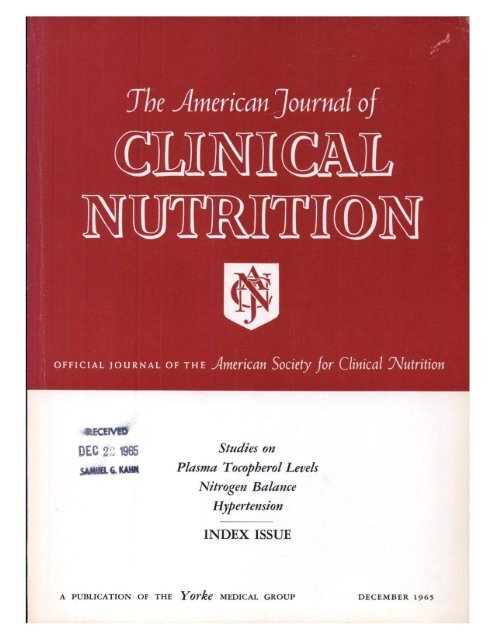美国西班牙裔/拉丁裔成年人的饮食模式、血清代谢物和心血管疾病风险:西班牙裔社区健康研究/拉丁裔研究(HCHS/SOL)的前瞻性分析
IF 6.5
1区 医学
Q1 NUTRITION & DIETETICS
引用次数: 0
摘要
背景:健康的饮食模式被推荐用于预防心血管疾病(CVD),但健康饮食模式、血液代谢物谱和CVD发生率之间的关系尚不清楚。目的:本研究旨在评估美国西班牙裔/拉丁裔成年人健康饮食模式和相关血清代谢物谱与心血管疾病发病率的关系。方法:该研究包括来自西班牙裔社区健康研究/拉丁裔研究的年龄在18-74岁的13,922名参与者。饮食模式评分,包括健康饮食指数(HEI)-2020、健康植物性饮食指数(hPDI)和替代地中海饮食评分(aMED),基于两次24小时饮食回忆,在基线(2008-2011)构建。主要结局是心血管疾病的发生,包括心肌梗死、心力衰竭和中风。在基线时无糖尿病的参与者(n= 4096)的亚样本中鉴定出与饮食模式相关的代谢物。使用多变量Cox回归评估饮食模式评分、个体代谢物评分和代谢物评分与CVD事件的相关性。结果:在中位9.7年的随访期间,13922名参与者中发生了260起心血管疾病事件。在调整了人口统计学、社会经济和行为因素后,较高的饮食模式评分与较低的心血管疾病风险相关(通过比较最高和最低四分位数,HEI-2020、hPDI和aMED的风险比[hr]分别为0.53[95%可信区间:0.30,0.92]、0.50[0.27,0.91]和0.62[0.36,1.07])。共鉴定出60种代谢物与所有三种饮食模式评分相关,其中45种代谢物与饮食模式评分呈正相关,15种代谢物与饮食模式评分负相关。多变量调整后,基于这60种饮食模式相关代谢物的总代谢物评分与CVD风险呈负相关(通过比较最高五分位数与最低四分位数,HR=0.57[0.35, 0.92])。结论:在美国西班牙裔/拉丁裔成年人中,更健康的饮食模式和相关的血清代谢物谱与较低的心血管疾病风险相关。本文章由计算机程序翻译,如有差异,请以英文原文为准。
Dietary patterns, serum metabolites, and risk of cardiovascular disease in United States Hispanic/Latino adults: a prospective analysis of the Hispanic Community Health Study/Study of Latinos (HCHS/SOL)
Background
Healthy dietary patterns are recommended to prevent cardiovascular disease (CVD), yet the relationships among healthy dietary patterns, blood metabolite profile, and incident CVD are not well understood.
Objectives
This study aimed to assess the associations of healthy dietary patterns and related serum metabolite profiles with incident CVD in United States Hispanic/Latino adults.
Methods
The study included 13,922 participants aged 18–74 y from the Hispanic Community Health Study/Study of Latinos. Dietary pattern scores, including Healthy Eating Index (HEI)-2020, healthful Plant-based Diet Index (hPDI), and alternate Mediterranean diet score (aMED), were constructed at baseline (2008–2011) based on 2 24-h dietary recalls. The primary outcome was incident CVD, encompassing myocardial infarction, heart failure, and stroke. Dietary-pattern-associated metabolites were identified in a subsample of participants free of diabetes at baseline (n = 4096). Associations of dietary pattern scores, individual metabolites, and metabolite scores with incident CVD were evaluated using multivariable Cox regression.
Results
During a median 9.7-y follow-up period, 260 CVD events occurred among 13,922 participants. After adjusting for demographic, socioeconomic and behavioral factors, higher dietary pattern scores were associated with lower risk of CVD [hazard ratios (HRs) = 0.53 (95% confidence interval: 0.30, 0.92), 0.50 (0.27, 0.91) and 0.62 (0.36, 1.07) for HEI-2020, hPDI, and aMED, respectively, by comparing the highest tertile to the lowest tertile]. A total of 60 metabolites were identified to be associated with all 3 dietary pattern scores, including 45 metabolites positively and 15 metabolites negatively associated with dietary pattern scores. A total metabolite score based on these 60 dietary-pattern-associated metabolites was negatively associated with the risk of CVD after multivariable adjustment [HR = 0.57 (0.35, 0.92) by comparing the highest tertile to the lowest tertile].
Conclusions
Healthier diet patterns and related serum metabolite profiles are associated with a lower risk of CVD in United States Hispanic/Latino adults.
求助全文
通过发布文献求助,成功后即可免费获取论文全文。
去求助
来源期刊
CiteScore
12.40
自引率
4.20%
发文量
332
审稿时长
38 days
期刊介绍:
American Journal of Clinical Nutrition is recognized as the most highly rated peer-reviewed, primary research journal in nutrition and dietetics.It focuses on publishing the latest research on various topics in nutrition, including but not limited to obesity, vitamins and minerals, nutrition and disease, and energy metabolism.
Purpose:
The purpose of AJCN is to:
Publish original research studies relevant to human and clinical nutrition.
Consider well-controlled clinical studies describing scientific mechanisms, efficacy, and safety of dietary interventions in the context of disease prevention or health benefits.
Encourage public health and epidemiologic studies relevant to human nutrition.
Promote innovative investigations of nutritional questions employing epigenetic, genomic, proteomic, and metabolomic approaches.
Include solicited editorials, book reviews, solicited or unsolicited review articles, invited controversy position papers, and letters to the Editor related to prior AJCN articles.
Peer Review Process:
All submitted material with scientific content undergoes peer review by the Editors or their designees before acceptance for publication.

 求助内容:
求助内容: 应助结果提醒方式:
应助结果提醒方式:


